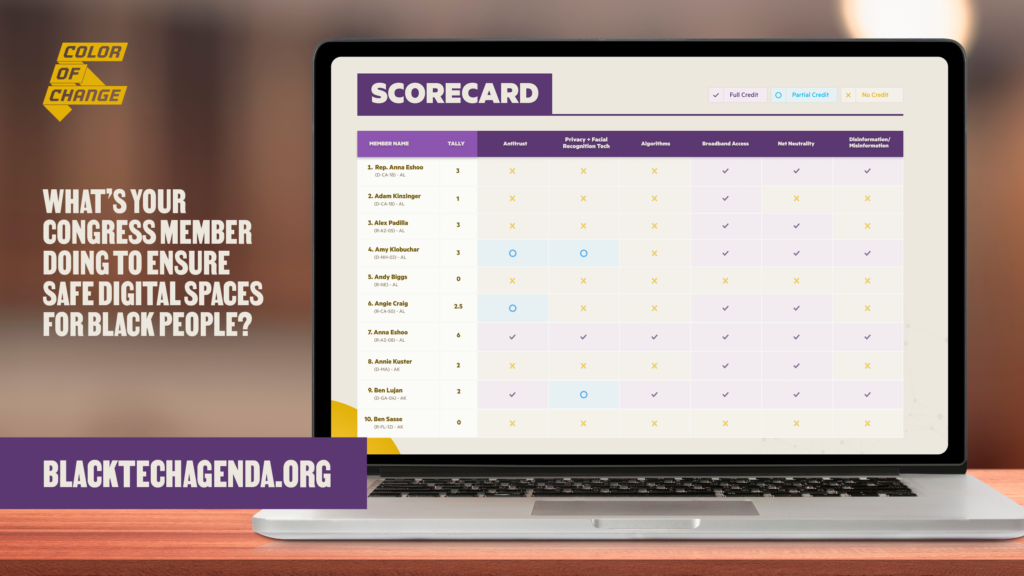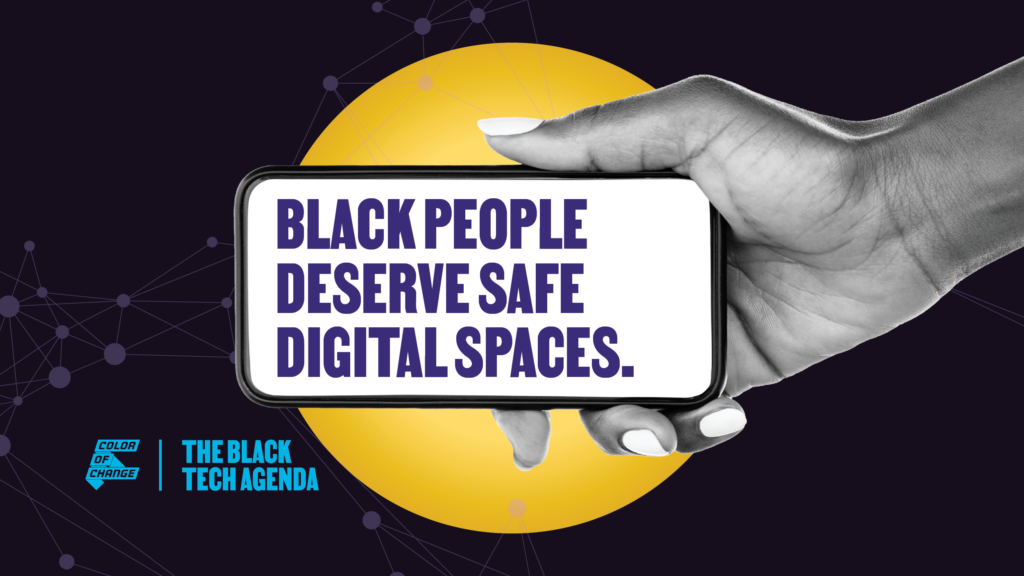Amid Twitter Chaos, COC’s Black Tech Agenda and Scorecard Launch


Color Of Change report
When Elon Musk took over Twitter last month, the ensuing chaos sent shock waves through Color of Change and its millions of members, as well as the nation’s other social justice organizations.
Musk immediately fired half of Twitter’s staff – including specialists who guard against hateful content and user data theft – then instituted a toxic work environment leading to an ongoing employee exodus.
A self-proclaimed “free speech absolutist,” Musk did nothing as hate speech spread like wildfire across the platform, and he seemed unconcerned about the potential spread of misinformation, even though the midterm elections were about to begin.
The Twitter train wreck is proof positive: Big Tech urgently needs federal regulation and oversight. It also underscores the importance of Color Of Change’s Black Tech Agenda and Scorecard, a new report that provides a road map for advancing racial equity in tech policy and highlights Congress’ failure to implement policies that tackle inequity in the tech industry.
Color Of Change President Rashad Robinson said Big Tech “has a very clear policy agenda full of fake solutions to real problems — empty ideas that will do nothing to address the harm Big Tech corporations cause to Black people and, in turn, all other communities online.”
“Letting Big Tech run the policy show means letting them chase profits no matter the cost to the rest of us,” said Robinson, who is also co-chair of the Aspen Institute’s Commission on Information Disorder.

Those costs, he said, include everything from suppressing the Black vote to denying Black people mortgage loans, jobs and critical health care. Big Tech damages small, Black-owned businesses that try to compete online and even ignores coordinated campaigns to harass Black people on social media.
Experts contend that the unchecked groundswell of racist and hateful rhetoric circulated on Twitter and other social media platforms has intensified political polarization and incited violence in our communities, including the Jan. 6, 2021, bloody insurrection at the U.S. Capitol and mass shootings targeting houses of worship and LGBTQ nightclubs.
On Twitter, for example, Musk announced he was in control by tweeting, “The bird is free.” As if on cue, hate speech shot up 500% within the first 12 hours as emboldened racists and other malicious actors posted hostile and vulgar tweets around race, religion and ethnicity.
When Musk fired more than half of Twitter’s 7,000-person workforce, others headed for the exits, too, effectively hollowing out departments charged with protecting the privacy and safety of Twitter users. The departures all but removed Twitter’s guardrails against the spread of toxic hate speech and disinformation.
Then, just days before the critical U.S. midterm elections, Musk announced the planned roll out of Twitter Blue, a money-making scheme that allowed Twitter users to purchase for $8 monthly a blue check mark indicating the user of the account has been verified. It raised the risk of impersonators setting up fake, unverified accounts and sending out false information that could have affected election turnout and the vote.
“What we have recognized time and time again is that self-regulated companies are unregulated companies,” Robinson said. “In so many ways, the technology that is supposed to bring us into the future is dragging us into the past.”
The Black Tech Agenda’s six pillars detail policy solutions for Congress to advance racial equity in the technology arena. The pillars include policy recommendations for addressing disinformation and misinformation by regulating algorithms and reducing monopoly power. The agenda calls for protecting privacy and ending online surveillance; preventing algorithmic discrimination by requiring companies to undergo independent audits and repairing the harm that has been done; expanding broadband access and affordability; supporting net neutrality by designating the Federal Communications Commission as the regulatory body for the internet; and advancing antitrust policy so that Black businesses can compete in a fair market.
The Black Tech Agenda is buttressed by the Black Tech Agenda Scorecard. Launched Nov. 17, the scorecard measures how members of key congressional committees align with legislation and policy solutions detailed in the agenda, including dealing with algorithmic discrimination, internet access and data privacy.
Based on the 148 lawmakers surveyed, more than 40 Republicans on key committees have failed on the scorecard, while four Democrats scored less than 3 out of a top score of 6.
Eight Democrats have received the top score, including Sens. Cory Booker of New Jersey, Elizabeth Warren and Edward J. Markey of Massachusetts as well as Reps. Yvette Clarke of New York and Pramila Jayapal of Washington state. All five lawmakers have endorsed the Black Tech Agenda.
“Part of the work we are doing at COC is elevating these issues, holding tech giants accountable, holding our government officials accountable and pushing advertisers and other enablers to pay attention to what’s happening,” Robinson said. Although Twitter has grabbed recent headlines, the problem is much bigger.
“Musk is not the first tech CEO to choose growth and profit over safety, integrity and security,” Robinson said. He noted that Color Of Change led a coalition of social justice groups demanding that advertisers boycott Facebook until the social media giant addresses the growing hate, bias and racism on its platforms.
Musk’s “recklessness reaffirms why we must continue to push for — and where possible enforce — accountability measures and make him honor his promises,” Robinson said. “That’s why we are continuing our call for an advertiser boycott to hit Musk and Twitter where it hurts until they make and enforce policies that will proactively address racist harassment and accounts that push harmful disinformation online.”
With misinformation rampant throughout the recent midterm elections, civil rights safeguards tossed aside by Musk and monopoly power threatening Black people’s safety online, Congress is one of the strongest tools to curb the outsized power in the tech industry. But power also is wielded by the people, as COC members showed during recent actions involving Twitter.
Within the first few days of Musk’s ownership of Twitter and just a week before the midterm elections, Robinson and other racial justice and civil rights leaders met with Musk, where he initially agreed to COC’s top three demands:
- Do not reinstate anyone banned from Twitter for violations, including inciting violence and hate speech;
- Maintain Twitter’s election integrity units monitoring attacks on the November elections, in particular efforts aimed at suppressing the vote and advancing misinformation;
- Provide clarity and transparency about the content moderation council that Musk said he would convene and insight around the process and policies on changes to content moderation.
“It became clear pretty early on that Musk was not going to hold to his word,” said Evan Feeney, deputy senior campaign director with COC’s Corporate Accountability Team. “Two days after the meeting, Musk fired half of the Twitter staff, including tons of people who work on tracking this information – content moderators, the engineers who make sure content moderation tools work appropriately.”

COC then “spun into action,” Feeney said. Letters were sent to Twitter’s major advertisers calling for a boycott of the platform. COC members sent more than 10,000 emails and made more than 800 calls demanding that corporations including Coca-Cola, Disney and HBO pull their advertising from Twitter.
Because of the pressure, more than a dozen major companies suspended their advertising on Twitter, leading to a massive drop in the platform’s revenue.
Through the pressure on advertisers, COC also forced Musk to delay the rollout of the Twitter Blue check mark plan until after Election Day. Feeney called it “a massive short-term win to protect election integrity.”
Without the delay, “it could have been an election nightmare,” Feeney said. “It easily could have been people pretending to be the Georgia secretary of state, or the Nevada secretary of state, telling people that a polling location had moved or that the hours had changed. And it would have been really hard for the general public to know what election information was true and what was not.”
Asked by an NPR host if COC trusts Musk to live up to his word, Robinson replied, “We trust action.” COC has seen the commitments of billionaire CEOs “go out the window when they come up against making money,” he said.
To make racial justice real in tech policy, Color Of Change will continue to mobilize our members to hold tech companies accountable and push elected officials to enact laws that will bring about systemic change and rein in the outsized power of Big Tech.
Learn more: Watch a short COC video about the Black Tech Agenda and holding Big Tech accountable by clicking here.
Do more: Sign a petition supporting the Black Tech Agenda by clicking here.
Do more: Sign a petition to keep Twitter safe, click here.

